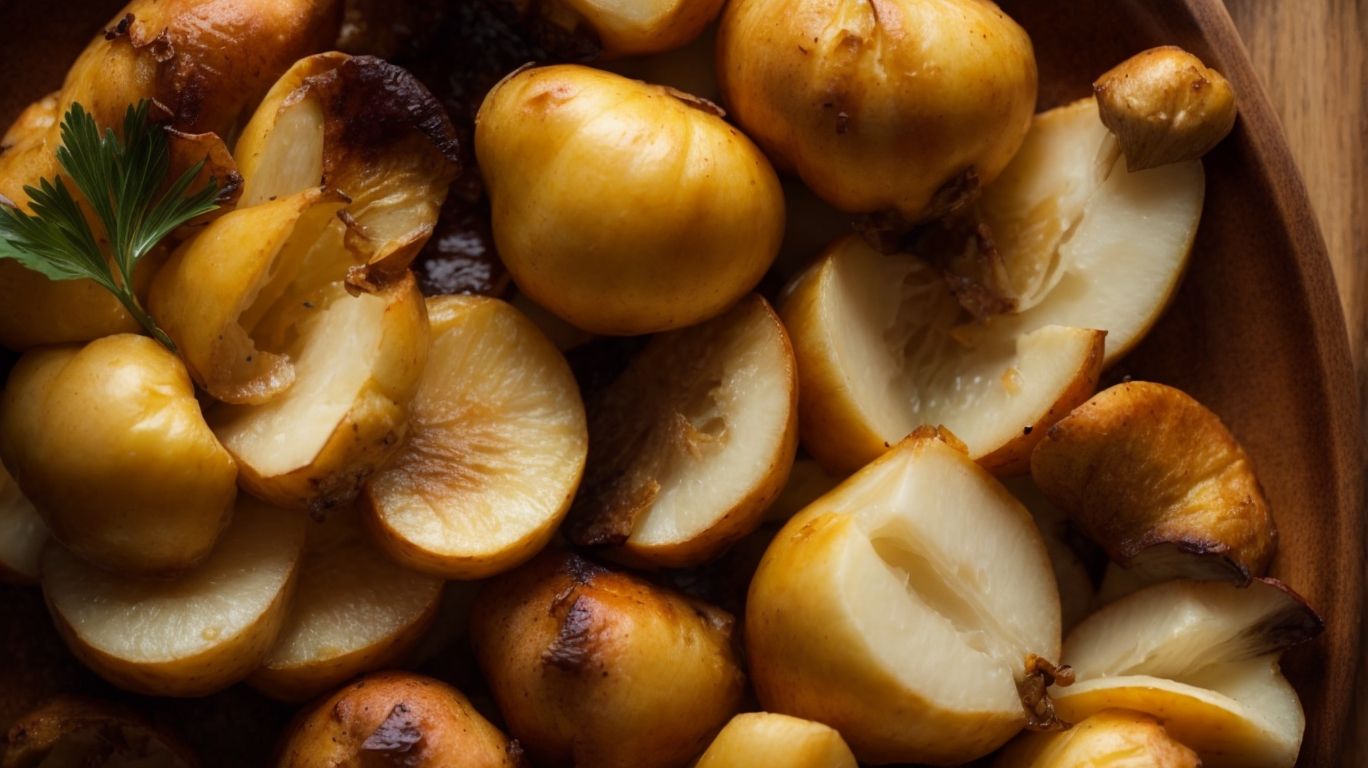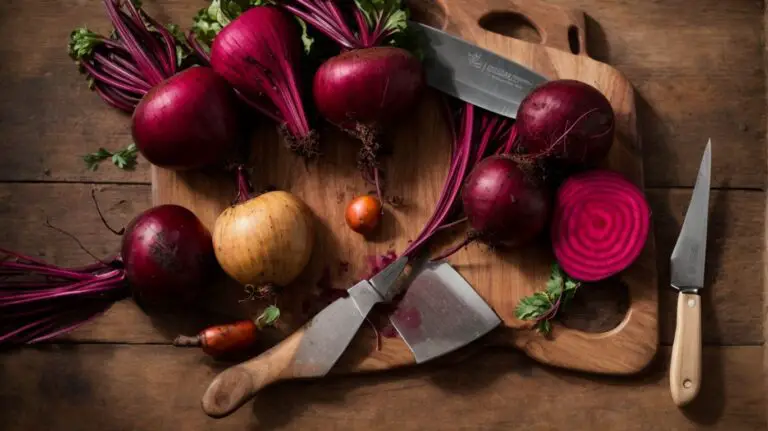How to Cook Sunchokes to Avoid Gas?
Curious about sunchokes and why they cause gas?
We explore the inulin content and enzyme deficiency that lead to digestive issues.
But don’t worry, we provide tips on how to prepare sunchokes to reduce gas, delicious recipes to try, and precautions to keep in mind.
Whether you’re a culinary enthusiast or just looking to enjoy sunchokes without the discomfort, we’ve got all the information you need. Let’s dig in!
Key Takeaways:
What Are Sunchokes?
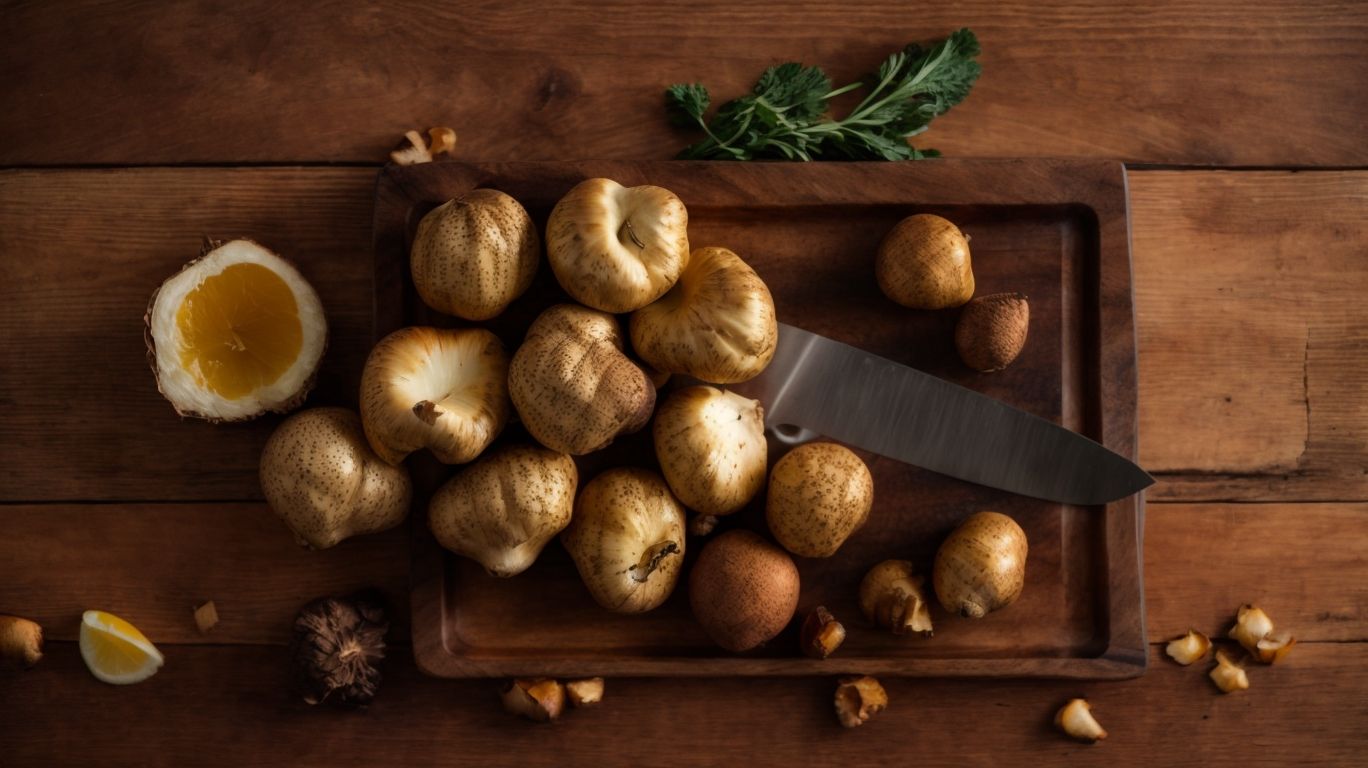
Credits: Poormet.Com – Thomas Anderson
Sunchokes, also known as Jerusalem artichokes, are tubers that belong to the sunflower family and are often consumed for their unique flavor and health benefits.
These versatile root vegetables are prized for their nutty, sweet taste and crunchy texture, making them a popular ingredient in culinary dishes ranging from salads to soups.
Rich in inulin, a type of soluble fiber that promotes good gut health, sunchokes are hailed for their positive impact on the digestive system. Inulin acts as a prebiotic, nourishing the beneficial bacteria in the gut and aiding in digestion.
It is essential to note that for some individuals, the high inulin content in sunchokes may contribute to gas and bloating as the body adjusts to this fiber. To minimize discomfort, gradually introduce sunchokes into your diet and cook them through methods like roasting or sautéing, which can help reduce the likelihood of digestive issues.
Why Do Sunchokes Cause Gas?
Sunchokes can cause gas due to their high inulin content, which may not be easily digested by the enzymes in the human digestive system, leading to fermentation and gas production.
When sunchokes are consumed, the inulin they contain, a type of carbohydrate acting as a prebiotic, passes undigested through the small intestine into the colon. Here, the natural bacteria, such as lactobacillus, start breaking down the inulin through fermentation. This process leads to the production of gases like hydrogen, carbon dioxide, and methane, causing the discomfort associated with flatulence. Essentially, for some individuals who might lack the necessary enzymes to efficiently break down inulin, increased gas production becomes a common side effect of consuming foods rich in this compound.
Inulin Content
The high inulin content in sunchokes acts as a prebiotic, promoting the growth of beneficial gut bacteria but can also lead to gas production through fermentation.
Prebiotics like inulin play a crucial role in nourishing the gut microbiota and enhancing overall digestive health. By serving as a fuel source for good bacteria, inulin aids in the maintenance of a healthy gut flora, which is key for proper digestion and immune function.
The fermentation process involved in breaking down inulin can sometimes result in bloating and gas production. It’s important to introduce inulin-rich foods gradually to allow the gut to adjust and minimize potential discomfort.
Lack of Enzymes
The lack of specific enzymes in the human digestive system can contribute to the gas problem associated with sunchokes, as these enzymes are essential for breaking down inulin effectively.
When inulin from sunchokes reaches the large intestine undigested due to enzyme deficiency, it serves as food for bacteria in the gut. As these bacteria ferment inulin, the byproduct produced is gas, leading to bloating and flatulence.
For individuals with lower levels of the required enzymes, such as inulase, the incomplete breakdown of inulin can result in uncomfortable digestive symptoms. To enhance inulin digestion and reduce gas issues, incorporating probiotics or consuming sunchokes in smaller quantities may be beneficial.
How to Prepare Sunchokes to Reduce Gas?
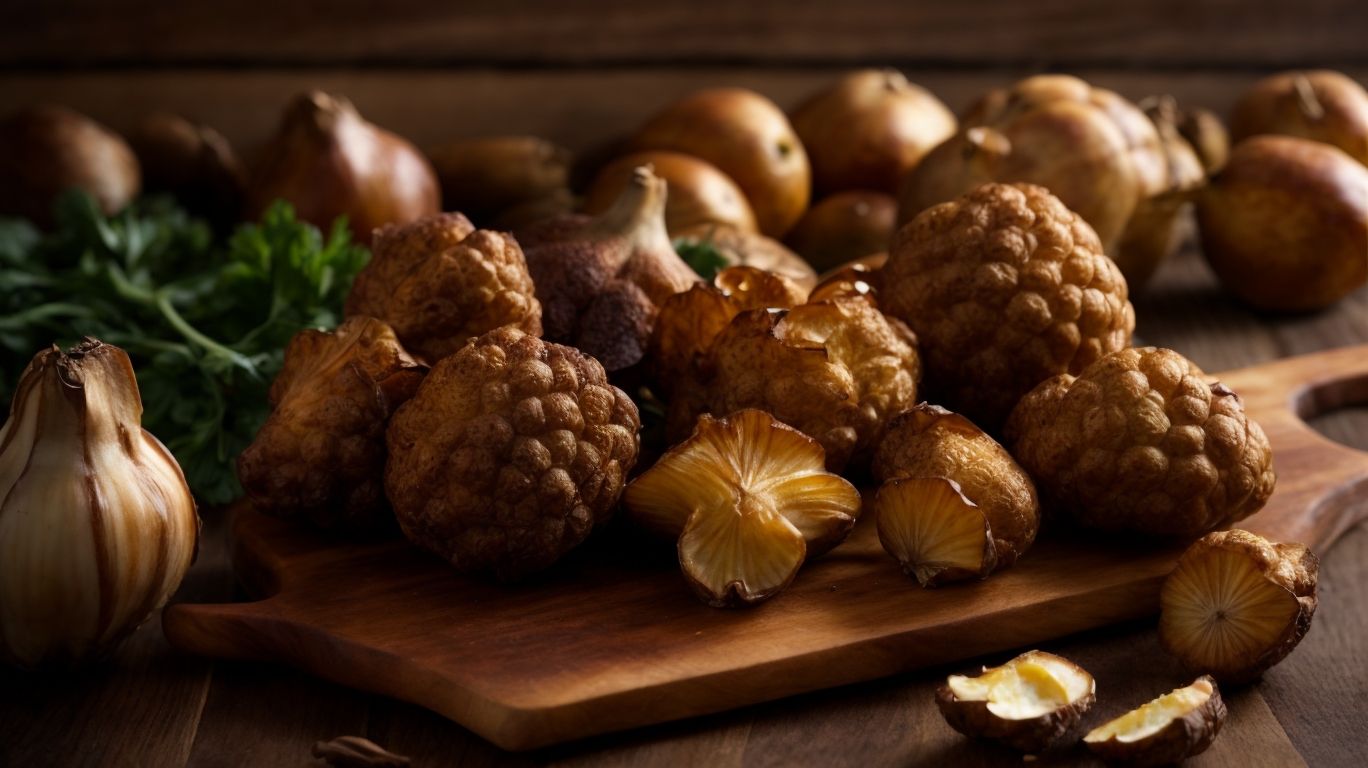
Credits: Poormet.Com – Ryan Miller
To reduce the likelihood of sunchokes causing gas, proper cooking methods such as pickling with vinegar or marinating with lemon juice can help break down inulin and minimize fermentation.
When pickling sunchokes, acid hydrolysis plays a crucial role in breaking down the complex sugars that contribute to gas formation.
Marinating with lemon juice not only adds a tangy flavor but also introduces an acidic environment that aids in neutralizing potential gas-causing compounds.
Experimenting with different herbs and spices in your pickling or marinating process can further enhance the flavor profile of sunchokes while making them easier on the digestive system.
Soaking Method
The soaking method involves submerging sunchokes in water to reduce flatulence by leaching out some of the inulin and preventing excessive fermentation in the digestive system.
Soaking sunchokes before consumption is a traditional practice known to alleviate digestive discomfort caused by their high inulin content. Inulin, a form of carbohydrate present in sunchokes, can be hard for some individuals to digest, leading to gas and bloating. By soaking the sunchokes, you help break down the complex sugars, making them easier on the digestive system. This process not only reduces the likelihood of experiencing flatulence but also minimizes the risk of excessive fermentation in the gut, which can cause discomfort and bloating.
Cooking Method
Proper cooking methods, such as roasting or boiling sunchokes, can help make them more gas-free by breaking down inulin through the application of heat and acid.
Roasting sunchokes at a high temperature helps caramelize the natural sugars in the vegetable, which can aid in reducing the gas-producing effects.
Boiling with a splash of vinegar or lemon juice can also assist in neutralizing the inulin content.
Consider incorporating the fermentation process to further break down the complex carbohydrates in sunchokes, making them easier to digest.
What Are Some Recipes That Use Sunchokes?
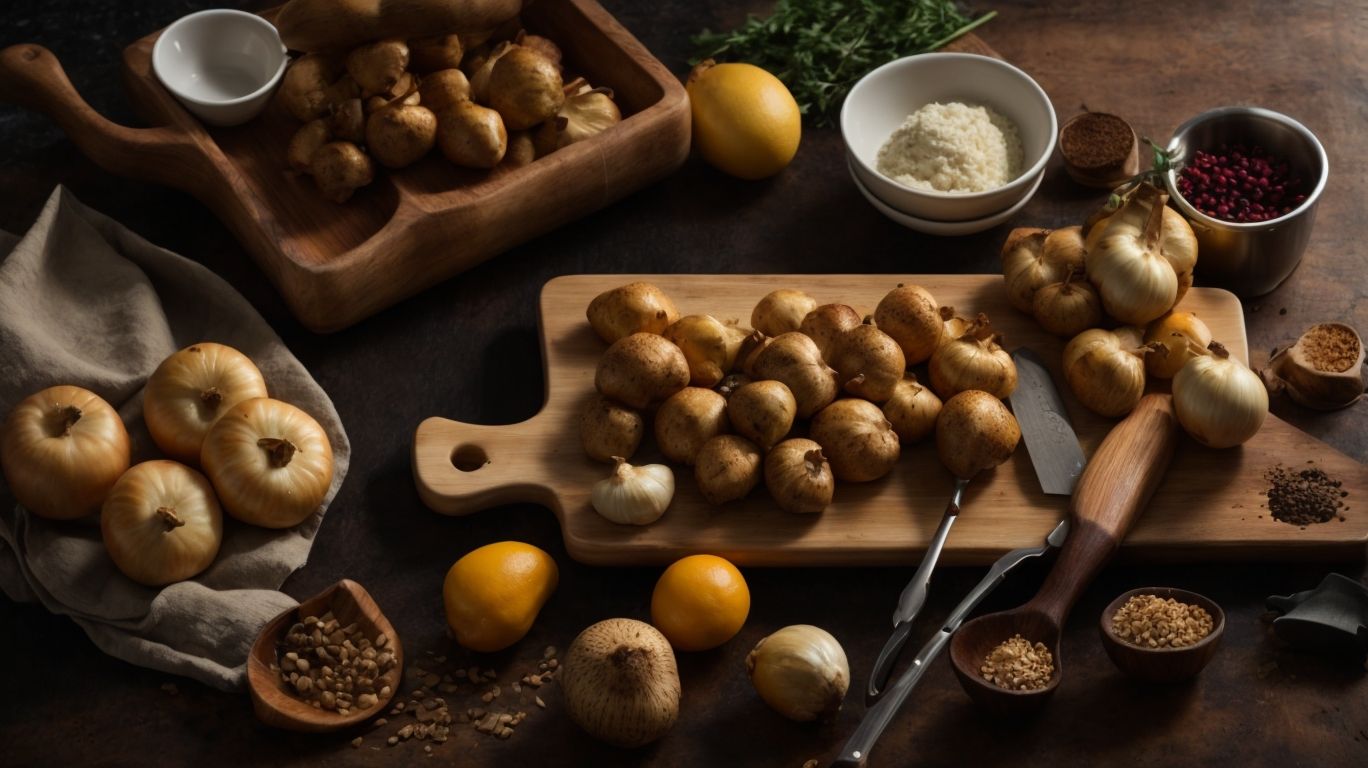
Credits: Poormet.Com – Gabriel Thomas
Explore a variety of delicious recipes that feature sunchokes, including Roasted Sunchoke and Potato Soup, Sunchoke and Arugula Salad, and Sunchoke and Mushroom Risotto.
Sunchokes, also known as Jerusalem artichokes, are versatile tubers that bring a unique flavor to dishes.
- For the Roasted Sunchoke and Potato Soup, start by cooking the sunchokes and potatoes until tender, then blend them with broth and seasonings for a comforting bowl of soup.
- Alternatively, the Sunchoke and Arugula Salad combines thinly sliced sunchokes with fresh arugula, tossed in a tangy vinaigrette for a refreshing side dish.
- In the Sunchoke and Mushroom Risotto, the earthy flavors of sunchokes and mushrooms meld beautifully with creamy Arborio rice, creating a luxurious and satisfying dish that is perfect for a cozy night in.
Roasted Sunchoke and Potato Soup
Roasted Sunchoke and Potato Soup is a comforting and flavorful dish that showcases the earthy sweetness of sunchokes complemented by the creamy texture of potatoes.
To start preparing this delicious soup, begin by preheating your oven to 400°F (200°C).
Wash and peel the sunchokes and potatoes, then dice them into uniform pieces to ensure even roasting.
Toss the chopped vegetables with olive oil, salt, pepper, and a sprinkle of thyme on a baking sheet lined with parchment paper.
Roast them in the oven until they are golden brown and caramelized, which helps to deepen their flavors and bring out their natural sweetness.
Sunchoke and Arugula Salad
Sunchoke and Arugula Salad is a refreshing and vibrant dish that combines the nutty flavor of sunchokes with the peppery bite of arugula, dressed in a light vinaigrette.
To assemble this delightful dish, start by thinly slicing the sunchokes after washing them thoroughly to remove any dirt.
Next, toss the arugula leaves in a bowl to create a bed for the sliced sunchokes. The contrasting textures and flavors of the sunchokes and arugula create a harmonious balance in every bite.
For the vinaigrette, whisk together olive oil, lemon juice, a hint of honey, and a touch of Dijon mustard to elevate the overall taste profile of the salad.
Sunchoke and Mushroom Risotto
Sunchoke and Mushroom Risotto is a creamy and comforting dish that highlights the earthy flavors of sunchokes and mushrooms, creating a decadent and satisfying meal.
Making this delectable Sunchoke and Mushroom Risotto starts with sautéing diced onions in a splash of olive oil until they turn translucent, providing a flavorful base for the dish. Arborio rice is then added and toasted, enhancing its nutty essence before gradually incorporating warm vegetable broth, which will be absorbed slowly to develop the risotto’s signature creamy texture. When the rice is almost cooked, a generous amount of finely chopped mushrooms and sliced sunchokes are mixed in, infusing the dish with rich, earthy notes.
What Are Some Tips for Cooking with Sunchokes?
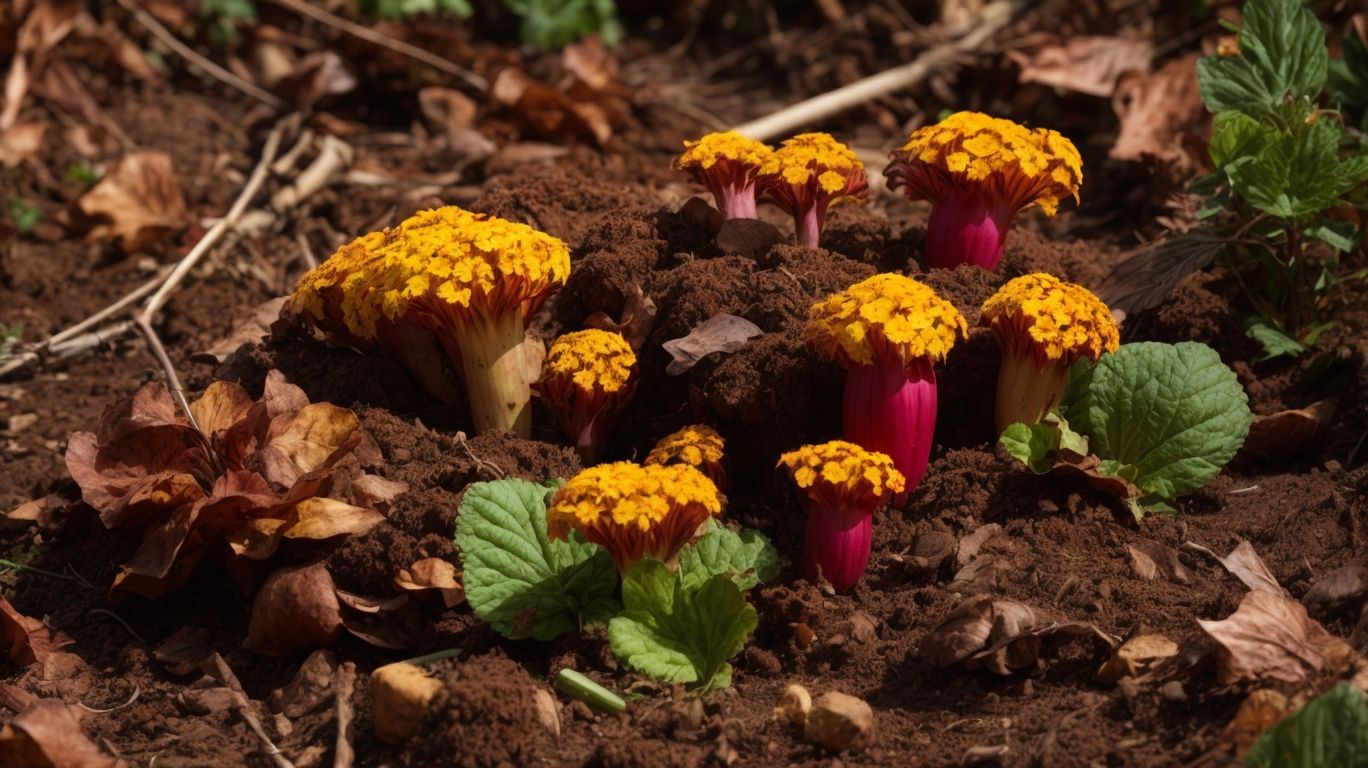
Credits: Poormet.Com – Willie Harris
When cooking with sunchokes, consider pairing them with digestive aids like herbs or spices, starting with small amounts, and combining them with other vegetables for balanced flavors and textures.
For those concerned about potential gas problems associated with sunchokes, a helpful tip is to soak them in water before cooking to reduce the inulin content that can cause digestive issues. You can include ingredients like lemon juice or vinegar in your preparations to help neutralize the compounds that can lead to bloating.
In terms of portions, it’s advisable to begin with moderate servings to gauge how your body reacts to this fibrous vegetable. Sunchokes are not only flavorful but also offer health benefits, such as being a good source of iron, potassium, and dietary fiber.
For a delicious combination, try roasting sunchokes with carrots and parsnips or adding them to soups and stews for a hearty and nutritious twist.
Pair with Digestive Aids
Pairing sunchokes with digestive aids like herbs or spices can help reduce the likelihood of digestive discomfort and enhance the overall flavor profile of dishes.
When including sunchokes in your meals, consider incorporating digestive-friendly herbs or spices such as ginger, mint, fennel, or turmeric. These natural ingredients not only add depth to the dish but also provide enzymes and promote better digestion. The probiotic benefits of certain herbs like basil or dill can further support a healthy gut microbiome, aiding in the breakdown of food and nutrient absorption.
Start with Small Amounts
Starting with small amounts of sunchokes in recipes can help mitigate potential gas issues and allow individuals to gradually adjust to their digestive effects.
When incorporating sunchokes into your culinary creations, it’s important to keep an eye on portion sizes to prevent any discomfort. One effective approach is to start with a conservative amount and slowly increase it as your body gets accustomed to this unique vegetable. By practicing portion control, you can savor the delightful flavor and health benefits of sunchokes without worrying about unwanted digestive disruptions.
Cook with Other Vegetables
Incorporating sunchokes into dishes with a variety of other vegetables can not only enhance the nutritional profile but also balance flavors and textures for a more satisfying culinary experience.
When cooking sunchokes with a mix of vegetables, you introduce a wealth of flavors and nutrients to your meals. Sunchokes, also known as Jerusalem artichokes, offer a subtly sweet and nutty flavor that pairs beautifully with earthy vegetables like carrots, beets, and parsnips. This combination creates a delightful harmony of tastes on your plate.
Furthermore, fermentation and pickling techniques can be employed to enhance the complexity of flavors. Fermenting sunchokes with other vegetables can add a tangy dimension, while pickling them can produce a delightful zesty crunch. These preservation methods not only elevate the taste but also promote gut health due to their beneficial probiotic content.
Are There Any Precautions for Eating Sunchokes?
To avoid potential digestive issues, it is recommended to avoid consuming raw sunchokes and opt for cooked or prepared versions to minimize the risk of gas discomfort.
Sunchokes, also known as Jerusalem artichokes, contain high levels of inulin, a type of carbohydrate that can cause flatulence and bloating when eaten raw. Cooking sunchokes breaks down the inulin, making them easier to digest and reducing the likelihood of gastrointestinal discomfort.
Health benefits of sunchokes include being rich in fiber, vitamins, and minerals, contributing to digestive health and overall well-being. Incorporating them into your diet in cooked forms like roasting, grilling, or sautéing can help retain their nutrients while minimizing potential side effects.
Avoid Eating Raw Sunchokes
Consuming raw sunchokes can exacerbate gas problems due to their high inulin content, making it crucial to cook or prepare them adequately to minimize digestive discomfort.
The inulin in sunchokes, a type of carbohydrate not easily digested by the human body, can lead to bloating and gas issues when consumed raw. Through cooking processes such as boiling, roasting, or sautéing, the inulin breaks down into more digestible components, reducing the likelihood of gastrointestinal distress.
One effective way to further enhance the digestibility of sunchokes is through fermentation. This process not only decreases their inulin content but also promotes the growth of beneficial bacteria that support gut health and aid in digestion.
Consult a Doctor if Gas Persists
If gas issues persist after consuming sunchokes, it is advisable to seek medical advice and consult a doctor to rule out any underlying health concerns or digestive issues.
While sunchokes are a delicious and nutritious addition to one’s diet, they can sometimes cause bloating and excessive gas due to their high inulin content.
Harold McGee, a prominent food scientist, emphasizes the importance of understanding how certain foods interact with our bodies and the potential consequences they can have on our digestive system.
Professional consultation can help identify any sensitivities or intolerances that may be contributing to the persistent gas problem associated with consuming sunchokes.
Conclusion: Enjoy Sunchokes without the Gas
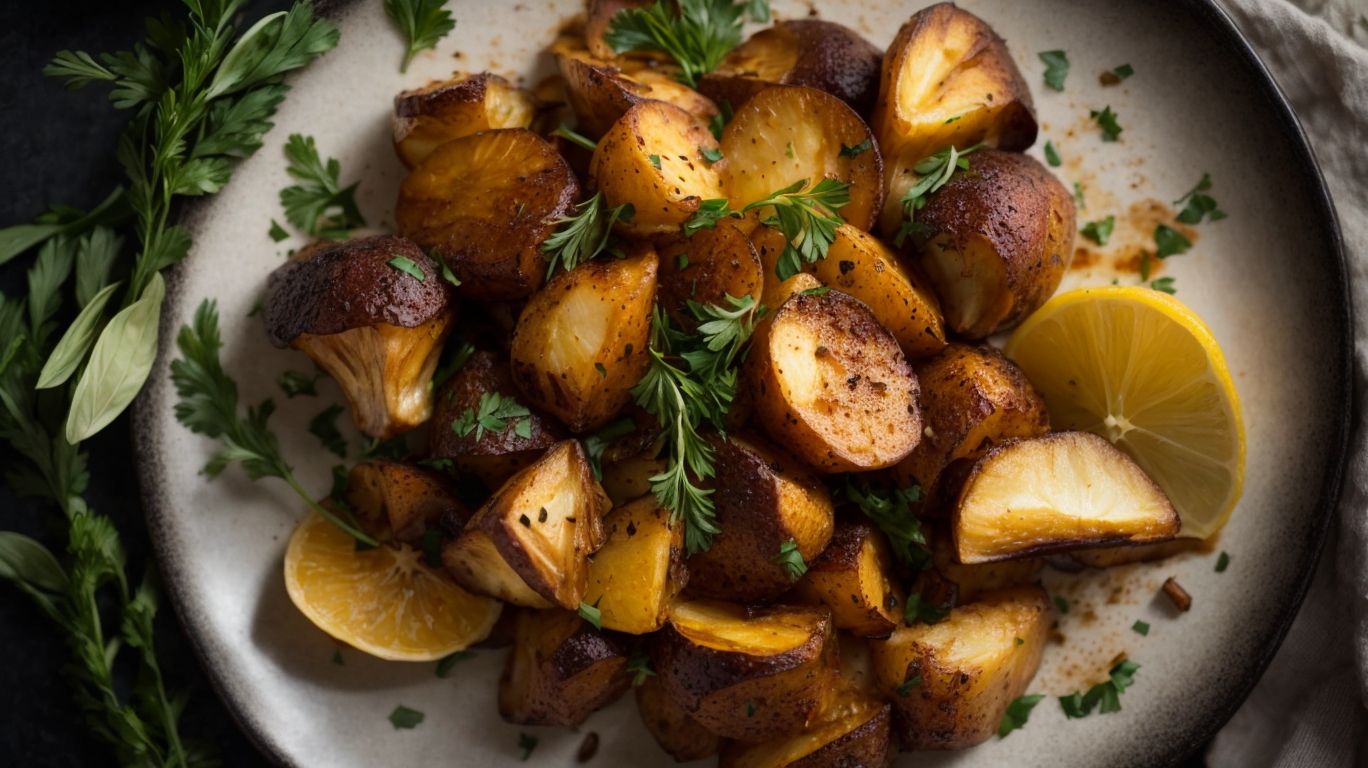
Credits: Poormet.Com – Juan Clark
By following proper cooking methods, pairing sunchokes with digestive aids, and gradually introducing them into your diet, you can enjoy the nutritional benefits of sunchokes without the unwanted gas discomfort.
One effective way to reduce the gas-inducing properties of sunchokes is through fermentation. Fermenting sunchokes can break down the inulin, making them easier to digest. Consider pickling or fermenting sunchokes to enjoy their unique flavor while minimizing digestive issues.
Incorporating sunchokes into meals alongside foods rich in probiotics can help improve gut health. Foods like yogurt, kefir, and sauerkraut can aid in digestion and reduce gas production when consumed with sunchokes.
Experimenting with different cooking techniques, such as roasting, sautéing, or pureeing sunchokes, can also make them more palatable and easier to digest. By diversifying your culinary approach, you can fully appreciate the earthy, nutty flavor of sunchokes without the discomfort of excessive gas.
Frequently Asked Questions
How to Cook Sunchokes to Avoid Gas?
1. What are sunchokes and why do they cause gas?
Sunchokes, also known as Jerusalem artichokes, are a root vegetable known for their nutty and sweet flavor. They contain a carbohydrate called inulin, which some people may have trouble digesting, leading to gas and bloating.
2. How can I prepare sunchokes to reduce their gas-causing effects?
To reduce the inulin content in sunchokes, you can soak them in water for at least an hour before cooking. This will help to break down the inulin and make it easier to digest.
3. Can I eat sunchokes raw to avoid gas?
While you can eat sunchokes raw, they are easier to digest when cooked. Plus, cooking them can help to further reduce their gas-causing effects.
4. What cooking methods are best for minimizing gas from sunchokes?
Roasting or sautéing sunchokes in a bit of oil can help to caramelize and break down the inulin, making them easier to digest. You can also boil or steam them, but be sure not to overcook them as this can make them mushy.
5. Are there any other ingredients I can pair with sunchokes to reduce gas?
Yes, you can try pairing sunchokes with ingredients that aid in digestion, such as ginger, turmeric, or fennel. These can help to counteract the gas-causing effects of sunchokes.
6. Are there any people who should avoid eating sunchokes altogether?
People with digestive issues, such as irritable bowel syndrome (IBS) or a sensitivity to FODMAPs, may want to avoid eating sunchokes altogether. It’s always best to consult with a healthcare professional before adding new foods to your diet.

